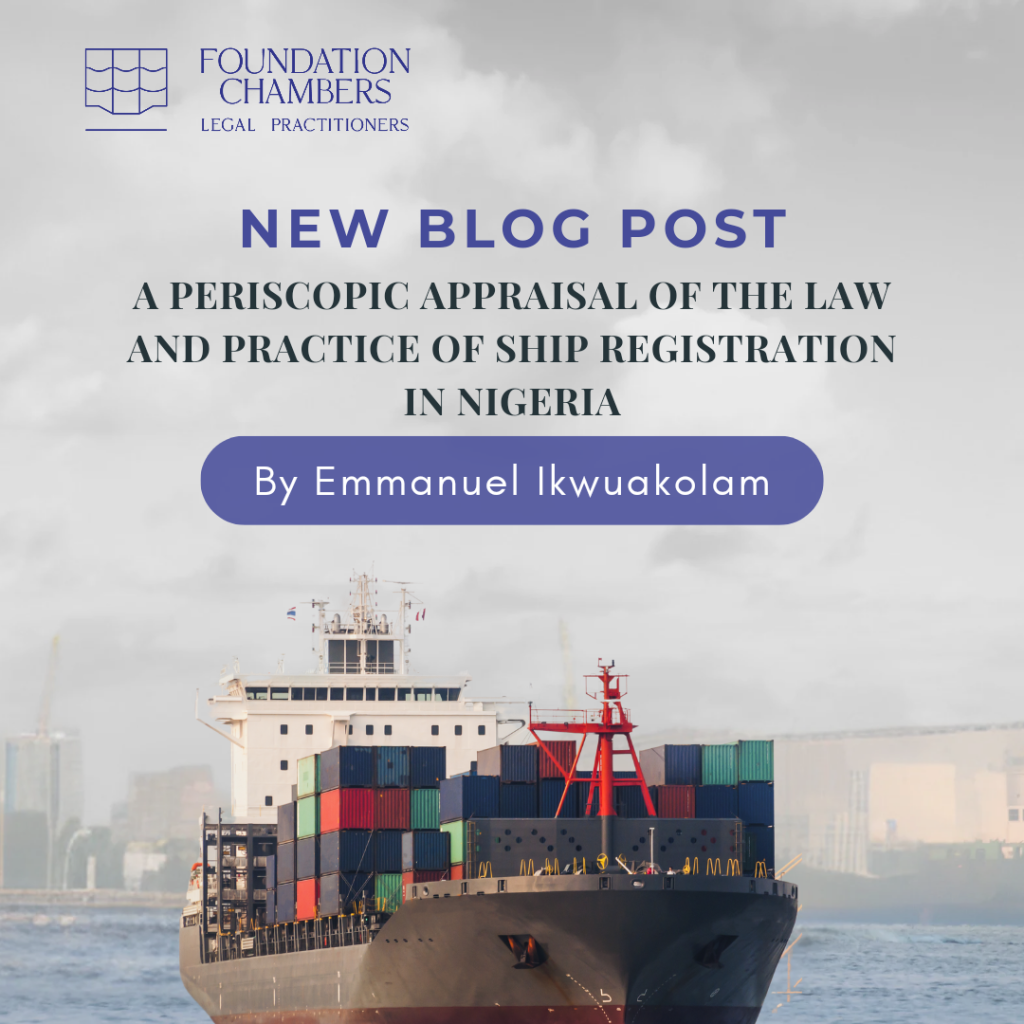A PERISCOPIC APPRAISAL OF THE LAW AND PRACTICE OF SHIP REGISTRATION IN NIGERIA
Introduction:
Ship registration is undoubtedly one of the most fundamental maritime administrative processes in any maritime nation. It does not only play a crucial role in maritime safety and security but significantly contributes towards the protection and preservation of the marine environment. The registration of ships has become a veritable mechanism to subject ships to national laws, regulations, and safety standards, thereby ensuring strict compliance with guidelines regarding tonnage, crew competency, proper maintenance, and inspections. In this post, we attempt to examine, amongst other things, the process of ship registration in Nigeria.
Conceptual Framework:
To enhance a proper understanding of ship registration, we shall simply define the term ‘‘ship registration’’ as the process by which a ship is documented and given the nationality of the country to which the ship has been documented.
Laws Governing Ship Registration
Registration of ships in Nigeria is primarily regulated by the Merchant Shipping Act 2007 and the Coastal and Inland Shipping (Cabotage)Act 2003. Also, the United Nations Convention on Laws of the Sea contains elaborate provisions relating to registration of ships.
Effect of Ship Registration
Registration of a ship under the laws of a country confers nationality of the country on the ship so registered, as well as the right to fly the country’s flag on its mast. Usually, such flag is hoisted when the ship is on the high sea and when entering or leaving any port in a foreign country. Additionally, upon being registered in a country, a ship becomes bound to the law of its flag state, that is, the laws of the country would apply in matters involving the ship, including regulatory control. See: Articles 91 & 92 United Nations Convention on Laws of the Sea 1982
Persons qualified to own a Nigerian registered ship.
Section 18(1) of the Merchant Shipping Acts specifies the categories of persons who are qualified to own Nigerian-registered ships:
- a) Nigerian
- b) Bodies corporate and partnerships established under and subject to Nigerian laws, having their principal place of business in
- c) Such other persons as the Minister of Transport may by regulations prescribe.
Body responsible for ship registration in Nigeria
The Nigerian Ship Registration Office is the Agency body saddled with the responsibility for ships registration in Nigeria. The Nigerian Ship Registration office is established under Section 28(2) of the Nigerian Maritime Administration and Safety Agency Act 2007 (‘‘NIMASA Act’’).
Registers to be kept for purposes of ship registration in Nigeria.
The Registrar of Ships is required to keep the following registers/books for purposes of ship registration:
(a) A register for merchant ships.
(b) A register for fishing vessels.
(c) A register for ships under construction.
(d) A register for ships on bareboat charters and other charters exceeding 12 months duration.
(e) A register for licensed ships below 15 gross tons; and
(f) A register for Floating Production Storage and Offloading (FPSO) and Floating Storage and Offloading (FSO).
See: Section 17(1) of the Merchant Shipping Act, 2007
Completion of the registration process
The Registrar shall on completion of the registration of a ship, issue a certificate of registration.
The certificate of registration of a ship shall be used only for the lawful navigation of the ship and shall not be subject to detention by reason of any title, lien, charge or interest which the owner or mortgagee or any other person has or claims to have on or in the ship.
See: Section 30(1)-(2) of the Merchant Shipping Act, 2007
Cancellation of Ship Registration
A mind-boggling question is whether a ship registration in Nigeria can be cancelled under any circumstances and the effect of any such cancellation. Section 28 of the Merchant Shipping Act 2007 empowers the Registrar of ships to cancel the registration of a ship under certain circumstances. The Registrar shall cancel the registration of a ship registered in Nigeria at any time, the ship appears to be registered also in a foreign country or ceases to comply with the qualifications for the ownership of a Nigerian ship as required by section 18 of this Act; or appears to have been lost, abandoned or broken up.
Conclusion
Ship registration is not only imperative but mandatory under international and domestic laws. It is mandatory under the United Nations Convention on Law of the Sea. In Nigeria, the Merchant Shipping Act 2007 and the Coastal and Inland Shipping (Cabotage) Act provide for the registration of ships. This undoubtedly flows from the enormous importance of ship registration, which has been emphasized in this work. However, it is the view of the author that this area of maritime practice has been long neglected by maritime scholars and practitioners. It is hoped that this paper would shed light into these key aspects of maritime practice.
The information presented in this blogpost is for general knowledge only. It does not constitute legal advice, and readers should seek professional counsel from us for specific situations. Any reliance on this information is at your own risk. We disclaim any liability arising from actions taken or not taken based on this content. No lawyer-client relationship is established by the receipt or use of this content.


